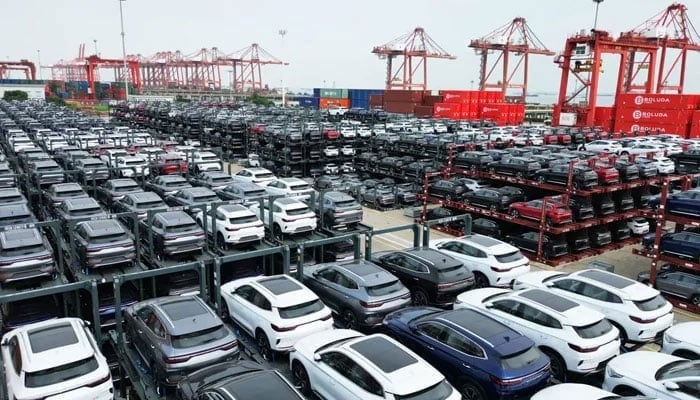Experts warn proposal to ease used car imports could undermine climate goals
LAHORE: The International Monetary Fund’s (IMF) recent recommendation to incentivise the import of used cars has drawn criticism from environmentalists and policy analysts, who argue that such a move could undermine the country’s transition to clean and sustainable energy solutions.
The IMF has urged Pakistan to lower high tariffs and duties on locally produced vehicles and permit the commercial import of used cars, in a bid to liberalise the country’s highly protected automotive sector. Used vehicles already account for over 60 per cent of total car transactions in Pakistan, and experts fear the proposed changes would further weaken the domestic automotive industry while exacerbating chronic air pollution, public health concerns and energy inefficiencies.
“Pakistan is already grappling with a serious transport-related emissions crisis. The sector is among the fastest-growing contributors to urban air pollution and greenhouse gas emissions,” said environmental policy analyst Dr Shafiq Ahmad Kamboh. “Allowing the import of used cars, many of which lack modern emission control technologies, will only worsen this burden,” he added. Dr Kamboh described the IMF’s position as contradictory, noting that while the institution has recently approved a $1.4 billion loan to support Pakistan’s climate resilience, it simultaneously promotes policies that could reintroduce high-emission vehicles into the market.
Dr Aneel Salman, chair of economic security at the Islamabad Policy Research Institute (IPRI), warned that the long-term consequences of increased used car imports would outweigh any short-term fiscal benefits. “Old, high-emission vehicles degrade air quality and undermine Pakistan’s commitments under the Paris Agreement. Without carbon pricing or scrappage incentives, these imports will have unchecked environmental impacts,” he said.
He further criticised the IMF’s trade liberalisation agenda for inadvertently shifting the environmental burden from developed to developing countries. “Used vehicles imported into Pakistan often serve as an extension of ‘cash for clunkers’ schemes in the Global North. These are vehicles that would have been scrapped under stricter emissions standards but instead find extended use in countries like Pakistan -- without the necessary environmental safeguards,” Dr Salman noted.
Environmental scientist and academic Dr Muhammad Irfan Khan agreed that the proposed policy shift would likely inflict more environmental harm than economic good, unless backed by strong regulation.
Experts fear that increased imports of older vehicles could undo progress made under Pakistan’s clean energy transition, compounding existing challenges related to air pollution, public health, and energy inefficiency. According to IPRI, the transportation sector contributes 43 per cent of airborne emissions in Punjab alone. The United Nations Environment Programme (UNEP) has similarly highlighted that the export of older, polluting vehicles to developing countries exacerbates environmental degradation and health risks.
To mitigate these impacts, environmentalists are calling on the government to recommit to the National Electric Vehicle Policy (2020-2025), which targets the conversion of 30 per cent of vehicles to electric by 2030. Strengthening existing incentives -- such as reduced customs duties, tax exemptions, and support for electric vehicle manufacturers and consumers -- could accelerate EV adoption and help build a more sustainable transport ecosystem.
-
 Gracie Abrams Follows 'Kylie Jenner Playbook' With Paul Mescal Romance
Gracie Abrams Follows 'Kylie Jenner Playbook' With Paul Mescal Romance -
 Dua Lipa Shares 'Love Letter' With New Boyfriend After Emily Ratajkowski Confirms Romance With Her Previous Beau
Dua Lipa Shares 'Love Letter' With New Boyfriend After Emily Ratajkowski Confirms Romance With Her Previous Beau -
 Brazilian Beauty Influencer Passes Away After Suffering 'medical Emergency'
Brazilian Beauty Influencer Passes Away After Suffering 'medical Emergency' -
 Sarah Ferguson Turns Into A Bulldozer With Beatrice, Eugenie: ‘Help Me Out’
Sarah Ferguson Turns Into A Bulldozer With Beatrice, Eugenie: ‘Help Me Out’ -
 Australian Prime Minister's Letter Against Andrew Mountbatten-Windsor Made Public
Australian Prime Minister's Letter Against Andrew Mountbatten-Windsor Made Public -
 'Project Runway' Alum Tim Gunn Reveals Why He's Been Celibate For 43 Years
'Project Runway' Alum Tim Gunn Reveals Why He's Been Celibate For 43 Years -
 Delroy Lindo Breaks Silence On John Davidson's Racial Slur Shock At 2026 BAFTA: 'We Did What We Had To Do'
Delroy Lindo Breaks Silence On John Davidson's Racial Slur Shock At 2026 BAFTA: 'We Did What We Had To Do' -
 King Charles Prepares Next Move As Andrew Shows No Remorse
King Charles Prepares Next Move As Andrew Shows No Remorse -
 Epstein's Brother Invited To Discuss Royal Family's Future After Andrew's Arrest, On Popular Show
Epstein's Brother Invited To Discuss Royal Family's Future After Andrew's Arrest, On Popular Show -
 BAFTA Winner Robert Aramayo Defends Director's Racial Slurs Amid Tics
BAFTA Winner Robert Aramayo Defends Director's Racial Slurs Amid Tics -
 Prince William, Kate Middleton’s Troubles Take On A New Face: ‘They’re Steeling Themselves’
Prince William, Kate Middleton’s Troubles Take On A New Face: ‘They’re Steeling Themselves’ -
 'Coronation Street' Star Sally Ann Matthews Finally Reveals Why She Quit ITV Soap
'Coronation Street' Star Sally Ann Matthews Finally Reveals Why She Quit ITV Soap -
 Prince Andrew's Major Sacrifice For Princess Beatrice, Eugenie Royal Titles Revealed
Prince Andrew's Major Sacrifice For Princess Beatrice, Eugenie Royal Titles Revealed -
 ICE Agent Misfired Bullet Into Minnesota Hotel’s Guest Room
ICE Agent Misfired Bullet Into Minnesota Hotel’s Guest Room -
 Andrew Mountbatten-Windsor, Fergie Still Counting On Each Other? Deets
Andrew Mountbatten-Windsor, Fergie Still Counting On Each Other? Deets -
 Piers Morgan Reacts To Photo With Ghislaine Maxwell
Piers Morgan Reacts To Photo With Ghislaine Maxwell




